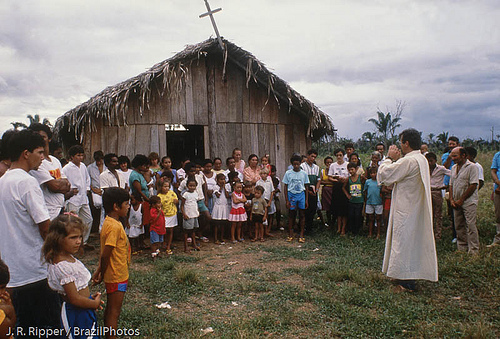I might find meal prayers boring, except that they are so often embarrassing in really interesting ways: accustomed to thinking of prayer as private, we (I mean “I and most other people I hear attempt to say grace”) stutter our way through public prayers, announcing to each other our appreciation for (or occasionally annoyance at) one another’s cooking or presence or travel to cover over the discomfort of trying to speak to God in front of someone else. It’s rich material for comedians, as in Will Ferrell’s famous “baby Jesus” grace or the less successful bit on casuistry about whether french fries need blessing, or, more devastatingly, Bart Simpson’s succinct, “We paid for all this stuff ourselves so thanks for nothing.”
And Pope Francis promotes this quaint, awkward, confused practice is an aspect of the struggle for ecological conversion.
227. One expression of this attitude is when we stop and give thanks to God before and after meals. I ask all believers to return to this beautiful and meaningful custom. That moment of blessing, however brief, reminds us of our dependence on God for life; it strengthens our feeling of gratitude for the gifts of creation; it acknowledges those who by their labours provide us with these goods; and it reaffirms our solidarity with those in greatest need.
A few days ago, Pope Francis made headlines with his statement that, “There is a real danger that we will leave future generations only rubble, deserts and refuse.” Pope Francis was opening the Vatican’s international conference on the third anniversary of Laudato Si by repeating his call for concerted action by states, local authorities, financial and economic institutions, and civil society. Then he noted,
All these actions presuppose a transformation on a deeper level, namely a change of hearts and minds. In the words of Saint John Paul II: “We must encourage and support an ‘ecological conversion’” (Catechesis, 17 January 2001).
Concerned about a future of “rubble, deserts, and refuse”? Then do your work to make change in political and economic and cultural structures in the world, and when you eat, say grace in a way that is tender, sober, full of the wonder of God’s goodness, and truthful about where the food we are eating comes from.
And it’s hard to do. Many of us have learned that prayer is interior and private, and so we find it hard to pray aloud, extemporaneously, without turning it into a performance for each other. That gives rise to a lot of the ridiculousness that comes out of our mouths (mine, anyway) when we try to pray out loud. Practice is a good thing. If we don’t know what we want to say to God, we probably ought to sit down and think about that for a while.
But being bad at extemporaneous prayers can also send us back to our spiritual mainstays, rote prayers like “Bless us, O Lord.” Generally, that’s good: as we say the same words across years, decades, good times and bad, awful meals and gorgeous ones, we discover new depths in them with each new repetition.
But to be honest, “Bless us, O Lord” is not working well now, because the stuff on the table we are naming as “thy gifts” are also commodities produced by methods that damage topsoil and waterways and add carbon to our environment at a catastrophic rate; and in many cases, rely on methods cruel and unjust both to humans and to nonhuman animals. The food we give thanks for is available to some and not to others, leaving 42 million people even in the US food insecure at some time in a year. God makes the earth to meet the needs of all; our food distribution system does not accomplish that purpose.
Of course we should avoid cooperation in evil. But we should eat and we will eat, and few if any of us will avoid materially cooperating in evil as we do it. So we need prayers that tell the whole truth, prayers that wonder at God’s goodness, grieve about our own roles in injustice, and cry out in hope for the reconciliation of all things.
Here’s kind of prayer I’ve been using, in an attempt to speak truthfully without despair or harangue, and to keep it short enough that the food doesn’t get cold.
“Blessed are you, O Lord, who make the earth a fruitful home that can meet the needs of all. Bless all who labor and all who hunger. Forgive us our sins, heal our world, and bring all creation one day into your great wedding feast. Amen.”
Why we pray. Prayer matters, but not because it is a way of making something else happen. We don’t pray as a way to
- convince God to do something, or
- win material protection for ourselves and our loved ones, or
- remind ourselves to be more moral.
We pray because prayer is sharing in God’s life, in a way that we can already do that even now, before the reconciliation of all things. We aren’t Christians without pouring our hearts out to God and listening to the heart of God speak to us. Every time we eat, we step into a web of grace and injustice, beauty and cruelty. That seems like a good occasion for prayer.



